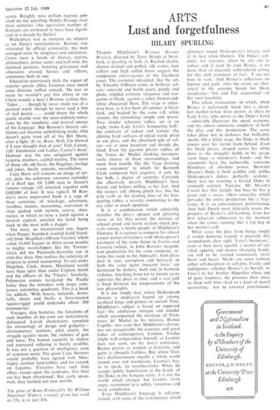Old salts
PETER VANSITTART
Etchings of a Whaling Cruise J. Ross Browne (Harvard/our 95s) Men and Ships Around Cape Horn 1616- 1939 Jean Randier (Barker 70s) Emigrating to America at twelve, James Ross Browne (1821-75) was a journalist, river-boat hand, political reporter, Treasury official, mining expert, confidential agent, lecturer, diplomat, real-estate developer, traveller. His humorous book on the Near East has been compared to Twain's Inno- cents Abroad. His writings incessantly ful- minate against official graft, bureaucratic bumbling and political chicanery from Sacramento to China. Restless, unromantic, his outspoken moral convictions often worked against his career but give life to writings that would otherwise slump into outdated topicalities.
At twenty-two he shipped as ordinary seaman on a whaler from New Bedford, for a poor man's Grand Tour. Challenged by Dana's Two Years Before the Mast, he compiled his Etchings (1842) to expose the plight of the whaling crews. Though influ- encing the composition of Moby Dick, it is inferior to Dana's masterpiece but has the humour the latter lacked. Dana loved seafaring and finely conveys immediate colours, awes, delights. Browne had the journalist's general curiosity and the moral- ist's indignation; he may cook facts to strengthen an argument—his plea for the oppressed. Thus his bullying Captain Alden seems a stock caricature beside Dana's more subtly sadistic Captain Thompson.
Closer to Marryat than to Dana or Mel- ville in his wry jocularity, zest for action, basic optimism and simple absolutes, Browne, a Rousseauist, is more convincing in minor asides than in set pieces. Yet his is the only important whaling book of the 1840s, still readable for its lively narrative and historical detail. Whale-cutting: Mada- gascan drugs like exhilarating gas: the Madagascans' disgusting ways of killing bullocks: rude rhymes at Napoleon's tomb on St Helena: a thief at Zanzibar left limb- less: the bloodstained decks piled with vast chunks of flesh and blubber beneath faces reddened by glaring fires. We see whites cheating islanders, destroying initial friend- liness by 'paying them with the fore-top sail'. And ships' games, the songs and shindys, the yarns of murder and ghosts. 'I have a natural fondness for ghosts', begins one old yarn-spinner, 'I was raised with them and feel as if they were my best companions'.
Much folklore originated in night wat- ches and dim forecastles. There are good stories. Queen Victoria presented a replica of her state carriage to the Sultan of gam- bling, disease-ridden Zanzibar, commending it for use in his parks and roads, which did not exist. Such royal gifts he usually prog- ged for ready cash. One Zanzibar beach was kept strewn with dead slaves. Slavery, amongst blacks and whites, continually recurs. Roughly nine million negroes per- ished on the appalling Middle Passage over three centuries. (An equivalent number of Russians are estimated to have been liquid- ated in a decade by Stalin.) Wickedness was as rampant on whalers as on Dana's merchantman. Browne was infuriated by official criminality, the men outraged more by stinginess and unfairness. Crews were a horde of thieves, rapists, philosophers, minor saints and half-wits, the dammed passions, festering grievances and obsessions created heroes and villians, sometimes both in one.
Education notoriously dulls the vigour of popular speech. (Max Eastman once heard some illiterate ruffian remark, 'He was so mean he wouldn't pay five dimes to see Christ wrestle a bear'.) Browne realises this.
'Tabor. .. though he never made use of a poetical word; though he never read a line of real poetry . . . could throw the whole poetic mantle over the most ordinary narra- tions by the simplicity and natural energy of his language'. But Browne's literary am- bitions can become embellishing tricks. One
doesn't quite trust all of his Bill Mann, after a fight. 'Et tu, Brute. Well, I'm blowed
if I ever thought that of you! Fall, Caesar, fall! Gentlemen and Ladies, Caesar's dead.' Humour was the one safeguard against hysteria, madness, capital mutiny. The sense of those vile old boats, the floggings, ravings and jokes, finally remains, nevertheless.
Cape Horn still remains an image of ter- ror, pain, the unknown, awesome reminder of a dead age. Of 2,000 men in Anson's famous voyage, 145 returned, together with £480,000 of loot. It was typical. M Ran- dier's more impersonal book is a saga of three centuries, of wreckage, adventure, frostbite, mutiny, marooning, starvation in ships packed with vermin, scurvy, rheu- matics, in which to raise a hand against a Spanish captain entailed the hand being stuck to the mast with a dagger.
The story, an international one, begins when Pepper Standard rivalled Gold Stand- ard; from Magellan's 100-ton 'Victoria' which sailed 14,460 leagues in thirty-seven months to mighty wool-clippers like the Torrens' which did the Plymouth-Australia run in sixty-five days. One realises the relativity of progress in actual seamanship. To sail under Magellan, Cook, Anson, Marchand would have been safer than under Captain Smith and the officers of the 'Titanic'. Similarly, Polynesian canoes navigated the Pacific better than the intruders with maps, com- passes, astrolabes, quadrants. This is a book for addicts. 'With braces, halyards, down- halls, sheets and brails, a three-masted square-rigger could undertake about 300 manoeuvres'.
Voyages, ship histories, the functions of each member of the crew are meticulously delineated. Lavish illustrations complete the chronology of design and gadgetry— chronometers, sextants, pilot charts, the struggle against steam, the violence of gale and wave. The human capacity to endure and transcend suffering is barely credible. It was not a question of intelligence, even of common sense. The great Cape Homers would probably have agreed with Mon- taigne, another land-lubber, and his remark on Lepanto, 'Firearms have such little effect, except upon the eardrums, that their use has been abandoned'. But, early space- men, they handed out new worlds.
The price of Brian Fothergill's 'Sir William Hamilton' (Faber), wrongly given last week as 75s, is in fact 63s.



































 Previous page
Previous page